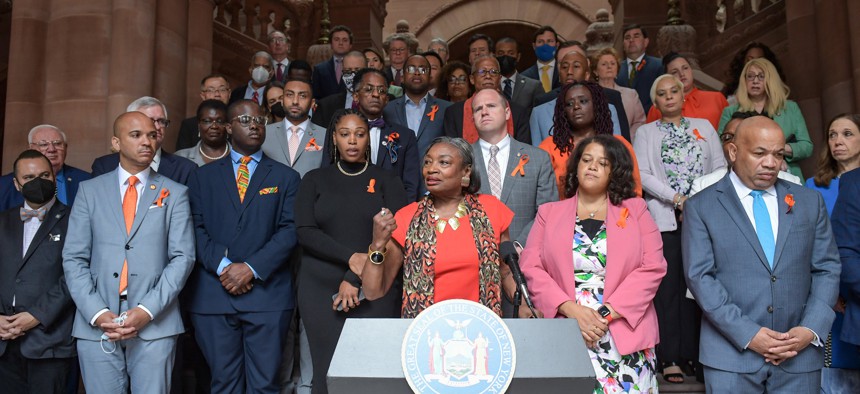
Good Morning from Albany…
Sine die. The Assembly adjourned sine die at 8am on Saturday, only about 36 hours late, joining the Senate who left Albany a little after 2am on Friday.
All things considered—time, action, absence of a “big ugly,” and the total craziness meter—the end of the 2022 legislative session was unremarkable.
What did pass:
More notable was what did not pass:
All this sets the final stage for June 28th when we will finally have primaries for Assembly, statewide offices, and judicial delegates. We will focus on these over the next couple of weeks but worth noting, gubernatorial debates are scheduled for June 7 (Democratic), June 16 (Democratic) and June 13 (GOP). There was also a debate between Democratic gubernatorial candidates Tom Suozzi and Jumaane Williams on Thursday but without Governor Kathy Hochul who was busy with the end of the legislative session.
There was also some more clarity towards some State Senate and Congressional races.
Some highlights:
New York City– David Yassky is now running for State Senate against Andrew Gounardes. Former New York City Comptroller Scott Stringer was looking to challenge Senator Brad Hoylman in a primary for a newly created seat on the West Side of Manhattan but Stringer has decided to forgo running for the seat.
In Washington, D.C….
Democratic Senator Chris Murphy shared that he is “growing optimistic” on gun negotiations with Republican colleagues. While there is a political appetite to do something, it is unclear exactly what provisions will attract the 60 votes needed to pass in the Senate.
President Biden is set to travel to Saudi Arabia for the first time since becoming President. Biden and Crown Prince Mohammed Bin Salman, the de facto ruler of the Kingdom, have had a rocky relationship as a result of the Biden administration’s concerns over human rights. Those concerns are well founded given a report finding MBS was complicit in the execution of Washington Post contributor Jamal Khashoggi. Still, Biden will have to find a path forward with Saudi Arabia given its energy prowess and security capabilities in the Middle East.
Finally, Queen Elizabeth’s Platinum Jubilee Pageant in London was overshadowed by some non-regal behavior from her 4-year-old great-grandson, Prince Louis, whose scene-stealing antics have since gone viral on social media.
-Jack O’Donnell
Would-Be Reagan Assassin John Hinckley, Jr. Gets Unconditional Release
A federal judge has confirmed that Ronald Reagan’s would-be assassin, John Hinckley, Jr., will receive a full unconditional release from prison on June 15. Hinckley was 25 years old on March 30, 1981, when he stood outside a Washington hotel and shot President Reagan, a Secret Service agent, a police officer and White House press secretary James Brady. [Read more.]
In The News
Biden Administration Sends $250M Military Aid for Ukraine
Trump Could Clinch the Nomination Before the G.O.P. Knows If He’s a Felon
Steve Scalise Diagnosed with ‘Very Treatable’ Blood Cancer
Eminem’s Beef with GOP Presidential Contender Ramaswamy Using His Music
X (Twitter) to Allow Political Ads from Candidates, Parties Ahead of U.S. Election
TV News Crew Robbed at Gunpoint While Reporting on Armed Robberies
Millions of Salaried Workers Would Receive OT Under Biden Administration Proposal
Liberals Raise Alarms, Calling on Biden to Sharpen Reelection Pitch
Biden Struggles to Make ‘Bidenomics’ a Plus, Not a Minus
Work Advances on Centennial Park, Northland Corridor Projects
Worth a Read
Biden Looks for New Ways to Energize Black Voters
Republican Women, Fearing Backlash on Abortion, Pivot to Birth Control
3 Hosts of an Eric Adams Fund-Raiser Are Said to Face Indictment
How the ‘Urban Doom Loop’ Could Pose the Next Economic Threat
This Fall's Covid Variant Might Really Be Different
NASA Spacecraft Reunites with Earth After 17-Year Trip Around the Sun
They Came to Find the Loch Ness Monster. What If They Do?
How the War in Ukraine Turned Tennis into a Battlefield
The Chess Cheating Scandal Ends with an Awkward Handshake
REM Sleep Is Magical. Here’s What the Experts Know.
Why the 1973 New York State SuperFair was Not So Super
Discover New York City's Seven Best Dive Bars
The 1980s Preppy Handbook is Again a Must-Read



